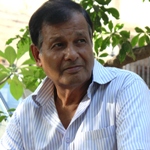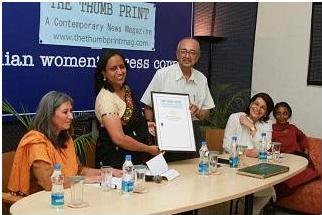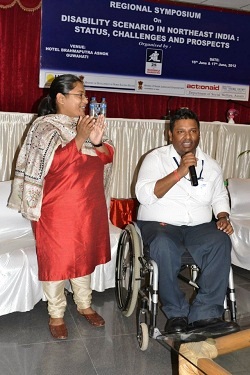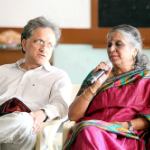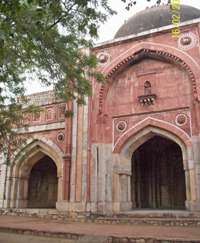Even if I search day and night through my entire life, shall I not find such rich land as Assam.
Nature has indeed offered bounteous gifts to Assam including such precious minerals as petroleum and coal and such agricultural crops as high quality tea which is acclaimed all over the world as an inexpensive and yet invigorating health drink. Further, it provides employment to more than seven lac workers 50% of whom are women. Tea industry further employs a sizable number of employees in its staff and executive cadres. There was a time when employment opportunities in Assam, particularly for the educated young people, were strictly limited and a job in tea with its 'attractive' remuneration packages and liberal fringe benefits made it highly lucrative. Besides, the lure of the sylvan surroundings and a serene ambience constantly beckoned the ambitious young job seekers.
This sprightly young man we are going to talk about, was born, brought up and educated in the historic town of Sivasagar, once the capital of the powerful Ahom kings. Steeped in history and strewn with exquisite historical relics all over, the town invites countless visitors from various parts of the globe. This was the place where Major Robert Bruce, the British adventurer and explorer saw the local variety of tea plants way back in 1823 and subsequently his brother Charles Alexander Bruce, who followed Major Bruce to Assam soon afterwards, formally earned the distinction as the discoverer of Assam tea. There are innumerable emerald tea plantations in and around Sivasagar which gave the young man a presentiment that his future was inseparably linked with tea.
Since he had seen tea plantations from his early childhood, he would always curiously notice the tea garden workers who had originally been brought by the British tea planters from the remote impoverished tribal areas in various states which comprise the present day states of Bengal, Bihar, Jharkhand, Odissa and even far away Andhra to work in the tea plantations of Assam. Notwithstanding their poverty and illiteracy, he was struck by their rich culture and felt a strong urge to work with them. He had in the mean time studied some social anthropology and soon after his graduation, proceeded to study sociology outside the state. Those days not many universities in India had offered Sociology at the post graduate level. He finally landed up in Bombay University (now University of Mumbai) where sociology department had a great reputation although it was a stiff competition for admission. But here surprisingly his surname came to his rescue!
The department of Sociology of University of Mumbai was set up by a renowned ecologist and town planner Sir Patrick Geddes. Through hard work over the years, Sir Patrick had built up the department as one of the foremost in the country. On his retirement in 1924, Prof G S Ghurye took over as the head of the department. Prof Ghurye was no ordinary man. He was a renowned scholar of his time. He originally studied Indology and Sanskrit, but subsequently, being inspired by Geddes, he pursued higher studies in Anthropology in Cambridge. Prof Ghurye was a nationalist and gave sociology a different abstraction and made it more India oriented with focus on Indian problems. He had authored many valuable books many of which are still parts of curriculum in various Indian universities.
So when our young man got a call from Prof Ghurye, he was very nervous. He went to meet Prof Ghurye with a firm assumption that he would not get admission. Downcast and diffident, he stood in front of the Professor. The professor scanned his application, grimly gawked at his face and thundered-
"You are from Assam, are you," said the professor almost tearing a strip off. "And your surname is Borooah?" he continued without waiting for a reply.
"Sir, I am...I mean, I am sorry..." the young man flustered and fumbled.
"Why should you be sorry? In fact you should be proud. The way you spell your surname, I presume you belong to the same family as that of Anundoram Borooah, the first Civilian from Assam and the fifth in India? He was a person of great scholarship besides being one of the finest and most able administrator, you know," Ghurye said with unmitigated admiration in his voice, "and he was the first Indian Civilian to be appointed as a District Magistrate."
"But, sir, I...am not..."
"Yes, yes, I know you are not as brilliant as him. As a matter of fact, no one that I can think of, could be as brilliant as Anundoram. He was an extra-ordinary talent beyond any comparison. Besides being an able administrator, he was a brilliant scholar in Sanskrit and since my initial training was in Sanskrit, I have read most of his works- Bhavabhuti and his place in Sanskrit Literature included. Amongst others were the rare and important classics like Mahaviracharita, Saraswatikanthavarana that he had published with his annotations which are great assets of the Indian literature. As an administrator also he was the first Indian civilian to be appointed a District Magistrate. What a pity that such a great genius lived to see only 39 springs. Guess what he could have achieved had he been granted a normal life span ........ "
"No Sir," the young bloke butted in. "What I mean is that my name is Jayanta Kumar Borooah alright, but I am not in any way related to the legendary figure Anundoram Borooah."
The Professor looked somewhat disappointed, but told young Borooah softly,
"Anyway, you are fro the land of Anundoram and I shall do what I can for you".
On completion of his M.A. in Sociology, JK returned to Assam. But he could not find a suitable job in tea that he had been looking for immediately. So he went for the next best option and joined a British shipping company called River Steam Navigation { R.S.N.} Company which used to run river transport on the Brahmaputra. It was otherwise a cushy job, but shortly afterwards following the Bangladesh War, river transport on the Brahmaputra was discontinued and consequently the company was wound up.
Meanwhile JK had already married a petite beauty and they were in the process of settling down to an ideal family life. Hence JK was a little distressed not having anything to fall back upon immediately. But he was also not exactly in a situation having to walk the streets for a job. One of his former colleagues in the previous company Harry Beattie, had moved to a senior position in an important company in Upper Assam those days, Assam Railway and Trading Company (ARTC). Since Beattie was aware of JK's passionate desire to work in tea, he spoke to the then Superintendent of Makum & Namdang Tea Company at Margherita in Upper Assam. The Superintendent Sandy Lakin called JK for an informal interview and without much ado asked him to take up his assignment as the personnel Officer of the company with immediate effect and JK's life in tea began.
Soon after joining tea JK discovered that life in tea was far from being placid and humdrum as he had originally thought it would be and as he had told his bride. On the contrary, with something or the other happening almost every day, there was hardly a dull moment. The young bride was initially amused by some of the entertaining incidents involving the garden workers. For example, soon after taking over the reins of the house-hold, the new bride tried to train her domestic staff regarding courtesy, decorum and social behavior. One day a visitor to their bungalow had asked for a glass of water and the bearer brought the water holding the tumbler in his hand. After the visitor left, the embarassed hostess called the bearer and explained to him that anything asked for by anybody should be brought on a tray. The next morning as one of their house guests was getting ready to go out, he asked the bearer to get his socks and the 'obedient 'bearer brought the pair of socks on a nice tray !
On another day - and it was a Sunday- after lunch, as JK was getting ready for a siesta, a bunch of queerly dressed youngsters barged into the bungalow completely ignoring the howling golden retriever and made themselves comfortable on the sofa set in the lobby. When the young lady came out to ask as to what had brought them there, they did not bother to get up or show any courtesy whatsoever. On the contrary, they rudely asked her to call her husband. JK who was familiar with the trend of the day, came out in his kurta-pajama and handled the situation without much difficulty. But his young wife got a jolt. Subsequently, however, she learnt to take things easy.
JK saw many phases through which the tea industry had passed over the years. Many eventful years he spent with the same company from which he gracefully retired. He has now settled down to a peaceful retired life. But age has not been able to torment him since he feels that old age has greater fire than the youthful years:
awaani se jyaada waqt-e-peeri josh hota hai,
Bharakta hai chirag-e-subah jab khaamosh hota hai.
(Anon)
Find us on facebook: facebook.com/TheThumbPrintMag

